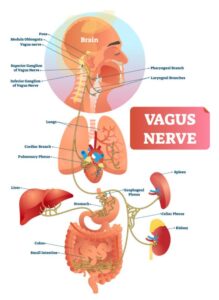If you’ve been working with a neurologist, a neurosurgeon, orthopedist, physical therapist or a chiropractor to try to manage your vertigo but haven’t been having success this is going to be for you. In this article, we’re going to go over the reasons why you may not be having success with your vertigo treatment and the next step you should take to start feeling better. Being able to identify the reasons behind your vertigo episodes and try to correct them is the first step in finding relief from vertigo for good.
What Triggers Vertigo?
So, what is vertigo? People with vertigo often describe it as a sensation of feeling off-balance, or feeling like the world is spinning around them. Vertigo is a very challenging dysfunction, causing people to have balance issues, and be at the risk of hearing loss. It can happen for a variety of different reasons. Some you may not even be fully aware can be causing your vertigo at all. A few examples of this are:
- Medications – One of the first things that many people don’t realize winds up becoming a challenge related to vertigo is that it could be from a medication that you’re on. A variety of medicines have been associated with vertigo, so it’s important to take a look at the small print list of side effects and see if vertigo is one of them. Dose reduction or discontinuation of the medicine may need to be considered to avoid continued vertigo symptoms.
- BPPV – This stands for Benign Paroxysmal Positional Vertigo, and it occurs when the calcium carbonate crystals become dislodged and move into one or more of the 3 fluid-filled semicircular canals. There are several kinds of maneuvers that work as great vertigo remedies if this is the particular type of vertigo you’re suffering from.
- TMJ or Jaw Issues – Also called temporomandibular joint disorder, is a disorder of one or both of your jaw joints. It can cause inflammation, which can then reach your inner ears. The inner ear is where the sensors are that tell your brain about your body’s positioning and movement, and inflammation disrupts those brain signals and can lead to vertigo.
- Spine Position – This massively gets overlooked and covers a significant amount of vertigo cases, our spines are designed to have a normal position and if we end up shifting out of place for whatever reason, then it cuts off how the brain stem works and the balance center.

Managing Vertigo
What goes on between episodes of vertigo and how you manage your stress throughout your day in your life wind up being another contributing factor in making vertigo happen more or less often as well as the occurrences being more severe or less severe. There are a lot of different factors as to what triggers vertigo attacks, from the food that you eat to simple tasks you perform throughout your day. Be aware of the following triggers and attempt to avoid them when possible.
- Quick Head Movements – Turning, tilting or moving the head quickly can trigger vertigo. Try to keep your movements slow and steady, this should help reduce the chances of vertigo occurring.
- Bending Down – Picking things up with your head going into a downward position can also be a trigger, when you go to pick something up, bend your knees so you can keep your head in an upright position.
- Confusing Visual Stimulation – Trying to walk around in the dark can disorient you and cause vertigo to occur, so always remember to turn on a light in the dark.
- Stress and Anxiety – These can have a dramatic impact on our physical health and trigger many types of symptoms as well as worsening medical conditions, although stress alone cannot cause vertigo, it can cause vertigo to worsen. Try to avoid stressful situations, or take up hobbies to help destress such as knitting or meditation.
Getting Treatment for Vertigo
There are several different ways to go about treating vertigo. From medication to surgery to simple exercises, there is no one size fits all answer, but working with a professional is key to finding a permanent solution for your issues with vertigo. To start off your road to recovery, working with a corrective chiropractor to figure out if your spine is aligned properly or not is vital to making sure that you get to full recovery from it and that you stay fully recovered, not just for several months, but for the rest of your life. If you have vertigo and have never reached out to a chiropractor for help, we highly recommend you do so before considering drugs or surgery.
If you or someone you know has experienced vertigo and is looking for how to treat vertigo naturally or to reduce what triggers vertigo, send this to them so they can check out some of the other tips that we have here so they can start to take action on changing their lives. At Align Wellness Center, we’ve treated many patients with vertigo. One of the questions we get asked often is how to get rid of vertigo for good. While there is no one-size-fits-all answer to what’s causing your vertigo, and what will help relieve vertigo symptoms, our team is dedicated to finding the root of the problem.
If you’d like tips on how you can stay healthy and well without drugs and surgery, go ahead and check out other articles on this site. If you continue to struggle with vertigo and dizziness give us a call at Align Wellness Center 847-564-9500 or schedule an appointment online.




